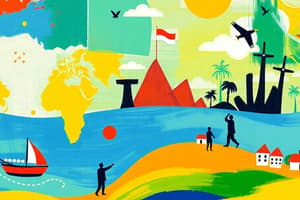Podcast
Questions and Answers
What is defined as the activity of traveling to a destination for leisure, business, or other purposes?
What is defined as the activity of traveling to a destination for leisure, business, or other purposes?
- Tourist
- Tourism (correct)
- Ecotourism
- Sustainable Tourism
Which type of tourism specifically involves responsible travel to natural areas?
Which type of tourism specifically involves responsible travel to natural areas?
- Cultural Tourism
- Medical Tourism
- Sustainable Tourism
- Eco-Tourism (correct)
Which tourism type emphasizes visiting rural areas to experience local lifestyles?
Which tourism type emphasizes visiting rural areas to experience local lifestyles?
- Leisure Tourism
- Adventure Tourism
- Rural Tourism (correct)
- Cruise Tourism
Which of the following types of tourism is primarily focused on cultural heritage?
Which of the following types of tourism is primarily focused on cultural heritage?
Medical tourism typically involves traveling for which of the following reasons?
Medical tourism typically involves traveling for which of the following reasons?
What is a primary characteristic of sustainable tourism?
What is a primary characteristic of sustainable tourism?
Which of the following is an example of adventure tourism?
Which of the following is an example of adventure tourism?
What does sports tourism involve?
What does sports tourism involve?
Which category of tourism is characterized by travel to receive cosmetic procedures abroad?
Which category of tourism is characterized by travel to receive cosmetic procedures abroad?
Which organization recommended the definitions of tourism that were adopted by the United Nations Statistical Commission in 1993?
Which organization recommended the definitions of tourism that were adopted by the United Nations Statistical Commission in 1993?
What is the maximum duration a person can stay in a place for it to be classified as tourism according to the accepted definition?
What is the maximum duration a person can stay in a place for it to be classified as tourism according to the accepted definition?
Which element is NOT considered part of tourism according to the World Tourism Organization's definition?
Which element is NOT considered part of tourism according to the World Tourism Organization's definition?
What is one of the main characteristics of tourism identified from the definition?
What is one of the main characteristics of tourism identified from the definition?
According to the WTO definition, what does the term 'usual environment' exclude?
According to the WTO definition, what does the term 'usual environment' exclude?
What is the primary focus of the managerial approach in tourism?
What is the primary focus of the managerial approach in tourism?
What is a disadvantage of the economic approach to studying tourism?
What is a disadvantage of the economic approach to studying tourism?
Which aspect does the sociological approach to tourism primarily examine?
Which aspect does the sociological approach to tourism primarily examine?
What dimension does the geographical approach to tourism primarily focus on?
What dimension does the geographical approach to tourism primarily focus on?
Which journal is noted for featuring the managerial approach in tourism studies?
Which journal is noted for featuring the managerial approach in tourism studies?
Flashcards are hidden until you start studying
Study Notes
Tourism Definitions
- Tourism involves traveling for leisure, business, or other purposes, characterized by temporary stays away from home.
- A Tourist is anyone who travels outside their usual environment for at least 24 hours but not exceeding one year, regardless of the purpose of travel.
- Sustainable Tourism aims to satisfy the current demands of tourists and local communities while safeguarding future opportunities.
- Ecotourism emphasizes responsible travel to natural regions, prioritizing environmental conservation and local community welfare.
- Cultural Tourism enables travelers to immerse themselves in the cultural heritage of a destination, exploring arts, history, and traditions.
Types of Tourism
- Leisure Tourism encompasses trips taken for relaxation and enjoyment, such as beach vacations and adventure sports.
- Business Tourism comprises travel for work-related activities, including meetings, conferences, and corporate events.
- Adventure Tourism focuses on activities that involve physical challenges and exploration, like trekking and scuba diving.
- Cultural Tourism is centered around experiencing a destination's culture, history, and heritage through museums and festivals.
- Medical Tourism refers to traveling abroad for medical services or cosmetic procedures, often motivated by cost savings.
- Eco-Tourism promotes responsible travel to natural areas, highlighting environmental conservation and local community enhancement.
- Rural Tourism emphasizes visiting rural locales to engage with local lifestyles through experiences such as farm stays and craft markets.
- Religious Tourism involves travel for spiritual reasons or to visit sacred places, including pilgrimages and site visits.
- Sports Tourism is driven by the desire to participate in or attend sports events, from the Olympics to marathons.
- Cruise Tourism involves journeying on a cruise ship, which provides accommodations and entertainment while stopping at multiple destinations.
Organizations Involved in Tourism
- Various significant bodies such as the League of Nations, United Nations, and World Tourism Organization (WTO) have addressed tourism.
- Other organizations include the Organization for Economic Cooperation and Development (OECD) and the U.S. Senate’s National Tourism Policy Study.
WTO’s Definition of Tourism
- Tourism is defined by WTO as activities of travelers staying outside their usual environment for leisure, business, and other purposes, for no longer than one year.
- Excludes trips within the usual residential area and routine trips to the workplace.
Main Characteristics of Tourism
- Involves movement to and activities in various destinations.
- Comprises both the journey and activities at the destination.
- Takes place outside the resident's usual living and working areas, leading to distinct activities from the local population.
Approaches to Studying Tourism
- Managerial Approach: Focuses on management practices necessary for tourist enterprises, addressing planning, research, and marketing.
- Economic Approach: Examines the impact of tourism on the economy, analyzing supply, demand, employment, and foreign exchange.
- Sociological Approach: Investigates tourism as a social activity, studying tourist behavior and the social effects on host communities.
- Geographical Approach: Analyzes the spatial aspects of tourism, including location, environment, and landscape changes due to tourism development.
- Interdisciplinary Approaches: Incorporates perspectives from psychology, politics, law, and transportation, recognizing tourism's multifaceted nature.
- Systems Approach: Integrates various approaches to create a comprehensive method addressing both macro and micro tourism issues.
Importance of Managerial Perspectives
- Rising disposable income and leisure time have fueled tourism industry growth.
- The industry comprises tangible (transport, hospitality) and intangible (culture, experiences) components.
- Effective service management is critical to balance tourist needs and resident interests.
Definition of Tourism
- Tourism encompasses the interactions among tourists, suppliers, governments, and communities aimed at attracting visitors.
- It includes a wide range of services and industries—transportation, accommodations, dining, entertainment—that enhance the travel experience.
- Tourism is also defined as the total visitor expenditures within a country and considers the economic multiplier effect of these expenditures.
Challenges in Defining Tourism
- The complexity of tourism leads to a lack of uniform definitions, complicating studies and analyses.
- Definitions often focus on specific situations, hindering the development of a comprehensive tourism discipline.
- Key steps for effective study include establishing uniform definitions, description, analysis, prediction, and control.
Studying That Suits You
Use AI to generate personalized quizzes and flashcards to suit your learning preferences.




